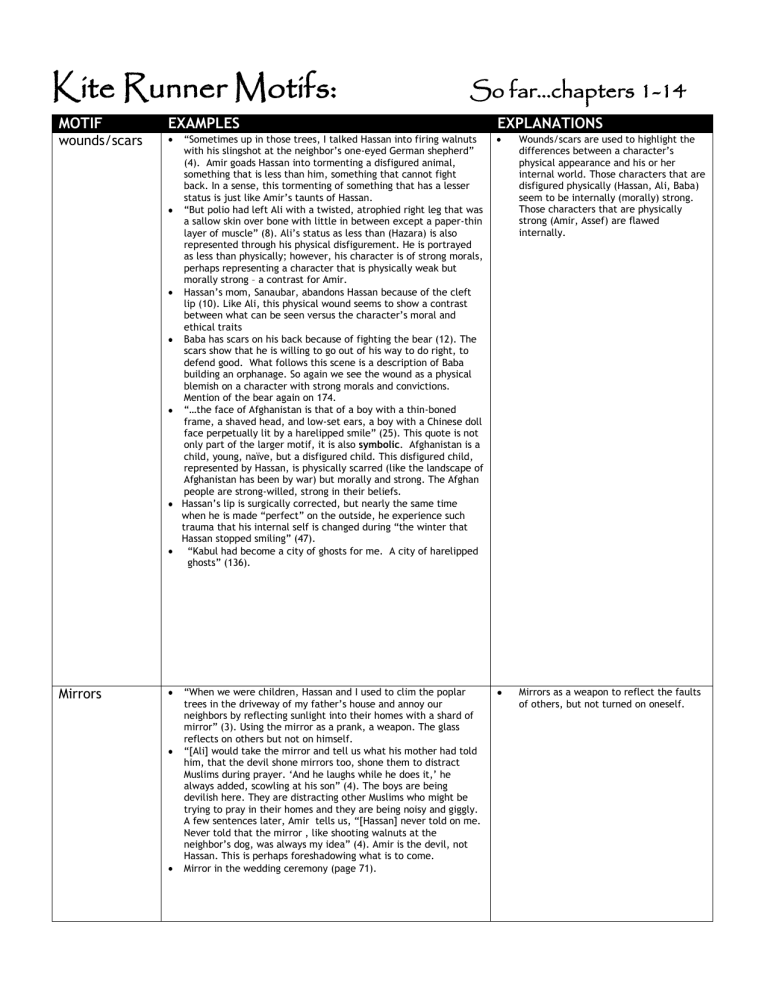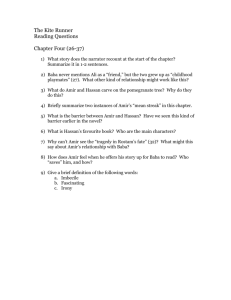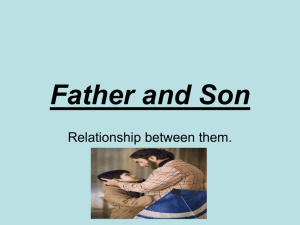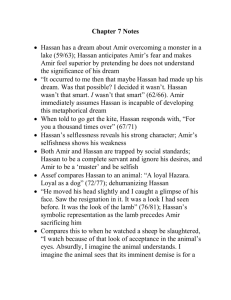Kite Runner Motifs

Kite Runner Motifs:
So far…chapters 1-14
MOTIF EXAMPLES
wounds/scars
―Sometimes up in those trees, I talked Hassan into firing walnuts with his slingshot at the neighbor‘s one-eyed German shepherd‖
(4). Amir goads Hassan into tormenting a disfigured animal, something that is less than him, something that cannot fight back. In a sense, this tormenting of something that has a lesser status is just like Amir‘s taunts of Hassan.
―But polio had left Ali with a twisted, atrophied right leg that was a sallow skin over bone with little in between except a paper-thin layer of muscle‖ (8). Ali‘s status as less than (Hazara) is also represented through his physical disfigurement. He is portrayed as less than physically; however, his character is of strong morals, perhaps representing a character that is physically weak but morally strong – a contrast for Amir.
Hassan‘s mom, Sanaubar, abandons Hassan because of the cleft lip (10). Like Ali, this physical wound seems to show a contrast between what can be seen versus the character‘s moral and ethical traits
Baba has scars on his back because of fighting the bear (12). The scars show that he is willing to go out of his way to do right, to defend good. What follows this scene is a description of Baba building an orphanage. So again we see the wound as a physical blemish on a character with strong morals and convictions.
Mention of the bear again on 174.
―…the face of Afghanistan is that of a boy with a thin-boned frame, a shaved head, and low-set ears, a boy with a Chinese doll face perpetually lit by a harelipped smile‖ (25). This quote is not only part of the larger motif, it is also symbolic . Afghanistan is a child, young, naïve, but a disfigured child. This disfigured child, represented by Hassan, is physically scarred (like the landscape of
Afghanistan has been by war) but morally and strong. The Afghan people are strong-willed, strong in their beliefs.
Hassan‘s lip is surgically corrected, but nearly the same time when he is made ―perfect‖ on the outside, he experience such trauma that his internal self is changed during ―the winter that
Hassan stopped smiling‖ (47).
―Kabul had become a city of ghosts for me. A city of harelipped ghosts‖ (136).
Mirrors
―When we were children, Hassan and I used to clim the poplar trees in the driveway of my father‘s house and annoy our neighbors by reflecting sunlight into their homes with a shard of mirror‖ (3). Using the mirror as a prank, a weapon. The glass reflects on others but not on himself.
―[Ali] would take the mirror and tell us what his mother had told him, that the devil shone mirrors too, shone them to distract
Muslims during prayer. ‗And he laughs while he does it,‘ he always added, scowling at his son‖ (4). The boys are being devilish here. They are distracting other Muslims who might be trying to pray in their homes and they are being noisy and giggly.
A few sentences later, Amir tells us, ―[Hassan] never told on me.
Never told that the mirror , like shooting walnuts at the neighbor‘s dog, was always my idea‖ (4). Amir is the devil, not
Hassan. This is perhaps foreshadowing what is to come.
Mirror in the wedding ceremony (page 71).
EXPLANATIONS
Wounds/scars are used to highlight the differences between a character‘s physical appearance and his or her internal world. Those characters that are disfigured physically (Hassan, Ali, Baba) seem to be internally (morally) strong.
Those characters that are physically strong (Amir, Assef) are flawed internally.
Mirrors as a weapon to reflect the faults of others, but not turned on oneself.
MOTIF
Pomegranate
EXAMPLES
―There was a pomegranate tree near the entrance to the cemetery. One summer day, I used one of Ali‘s kitchen knives to carve our names on it: ‗Amir and Hassan, the sultan of Kabul‘‖
(27).
―‘Hit me back!‘ I spat. ‗Hit me back, goddamn you!‘‖ (92). Amir asks Hassan to throw the pomegranates at him.
EXPLANATIONS
Pomegranate as symbol of resurrection and redemption:
• In Christianity, the pomegranate can be seen as a symbol of resurrection and life everlasting in Christian art, the pomegranate is often found in devotional statues and paintings of the Virgin and
Child.
• The pomegranate also figures into
Islamic stories. The heavenly paradise of the Koran describes four gardens with shade, springs, and fruits—including the pomegranate. Legend holds that each pomegranate contains one seed that has come down from paradise.
5
Pomegranates have had a special role as a fertility symbol in weddings among the
14 A prized Bedouins of the Middle East.
pomegranate is selected and split open by the groom as he and his bride open the flap of their tent or enter the door of their house. Abundant seeds ensure that the couple who eat it will have many children.
• "According to the Quran, the gardens of paradise include pomegranates. It is important, tradition says, to eat every seed of a pomegranate because one can't be sure which aril came from paradise."
And pomegranates protect the eater from envy and hatred.
• Amir seems to return to the image of ghosts during moments of regret and guilt.
Ghosts
Lamb
― I am a ghost now.
I think, a ghost with no footprints ‖ (74).
Amir‘s dream during the rape of Hassan.
―Kabul had become a city of ghosts for me. A city of harelipped ghosts‖ (136).
Flashback/dream of Baba sacrificing the lamb for Eid: ―…a day to celebrate how the prophet Ibrahim almost sacrificed his own son for God…‖ (76).
Politics/History
The coup – Taliban take over at the same time that Hassan has surgery and later raped (35).
―Maybe Hassan was the price I had to pay, the lamb I had to slay, to win Baba‖ (77).
• The innocent lamb represents a sacrifice. The lamb, Hassan, is
―sacrificed‖ by Amir. Amir watches
Hassan, sacrifices him, so that Amir can have a better relationship with Baba.
• The lamb is a religious symbol:
• All three major religions share the story of Ibrahim/Abraham which celebrates how he would have sacrificed his son to God, but at the last moment, God requests the sacrifice of a lamb.
• The lamb‘s blood over the doorway as a protection (Passover); the lamb as a protector.
• Jesus referred to as a lamb – an innocent savor of the people. Is
Hassan a Christ-like character?
Political and historical conflict seems to occur when the characters also undergo personal conflict. The political drama seems to be framing the novel.
Brass
Sickness
MOTIF
Dreams
Vehicles
EXAMPLES
Multiple dream sequences:
Hassan‘s dream – ―‘There is no monster, just water.‖ Hassan is afraid to go into the lake because he fears there is a monster.
Amir jumps in to show there is no monster. Later Hassan says just before the kite flying contest, ―‘Remember, Amir agha. There‘s no monster, just a beautiful day‘‖(59-61). Later, Amir recalls this dream and states, ―I was the snake in the grass, the monster in the lake‖ (105).
Amir‘s memories – ―Did you know Hassan and you fed from the same breast?‖ (73). The fortune-teller looks solemnly at Hassan
(74). Lost in the snowstorm (74). All these recur to Amir as he watches Hassan in the alley with Assef. Later, Amir recalls the slaughtering of the lamb for Eid (76).
Escape from Afghanistan in the fuel tanker
The change of vehicles in the United States: from Buick to VW van to selling the van following Baba‘s death.
When Baba discovers he has cancer (156).
Amir‘s recurring car sickness, especially when Hassan‘s name in mentioned (134).
Rahim Khan‘s sickness (217).
Soraya‘s mother, Khala Jamila, is a bit of a hypochondriac (177).
Assef‘s brass knuckles – page 38 and 41
EXPLANATIONS
Regret or guilt
Scenes with vehicles seem to come at moments of chaos and transition.
The ride in the fuel tanker is a move from being powerful and wealthy in
Afghanistan to a emasculated in America
(buying the used Buick).
Characters seem to experience a loss of spirit, loss of themselves around the motif of sickness.
Baba‘s cancer comes at a time when he has become powerless, unrecognizable as his former self.
Rahim Khan is no longer surrounded by those he cares about.
Jamila seems to yearn to sing professionally but doesn‘t because of her husband and instead finds pleasure in describing everything that is wrong with her.
Amir‘s car sickness comes hand-in-hand with his guilt about Hassan.
Brass is mentioned in times when protection is needed.
Assef uses the brass knuckles to
―protect‖ himself (aggressive)
MOTIF EXAMPLES EXPLANATIONS


